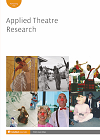
Full text loading...

In this article, we present and discuss how traditional Chinese culture is connected to moral education (deyu), current governmental strategies in education and educational drama as an approach to moral education. We argue that the mixture in deyu of moral and ideological education in today’s China is nothing new, and totally consistent with China’s pre-revolutionary periods. Although current government strategies in education emphasize aesthetic subjects such as drama/theatre (Xiju), and include methods and conventions in educational drama, it is hard to perceive whether the policy is open to an explorative learning process, characteristic of educational drama, or rather implies a more classical approach, based on textbooks and memorization, or even pure learning techniques. Nevertheless, processual processes to drama seem to harmonize with ambitions in China’s current school reforms and to be relevant to moral education within a social framework.

Article metrics loading...

Full text loading...
References


Publication Date:
https://doi.org/10.1386/atr_00065_1 Published content will be available immediately after check-out or when it is released in case of a pre-order. Please make sure to be logged in to see all available purchase options.